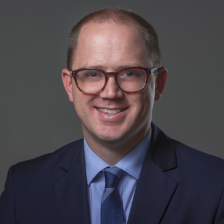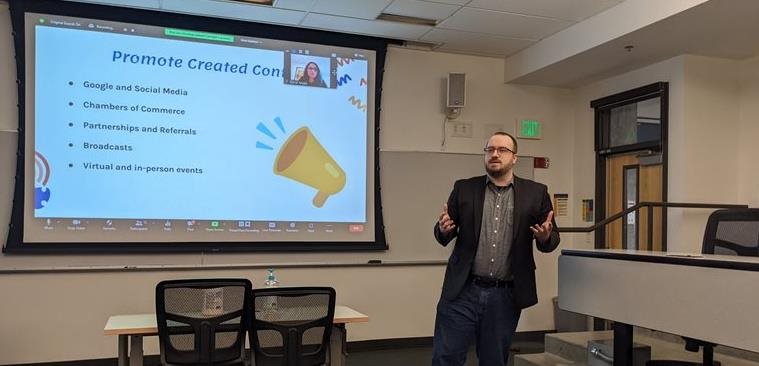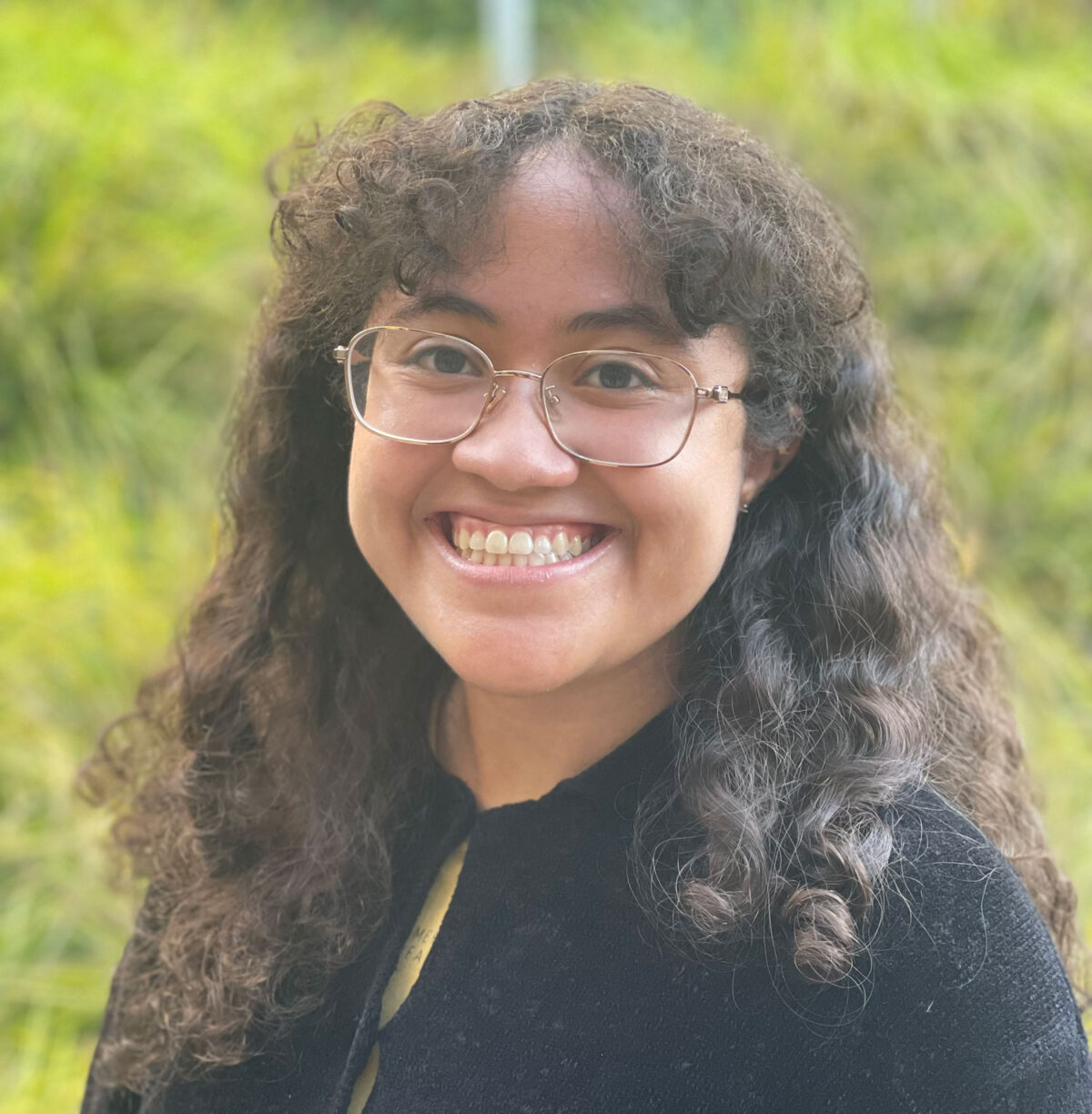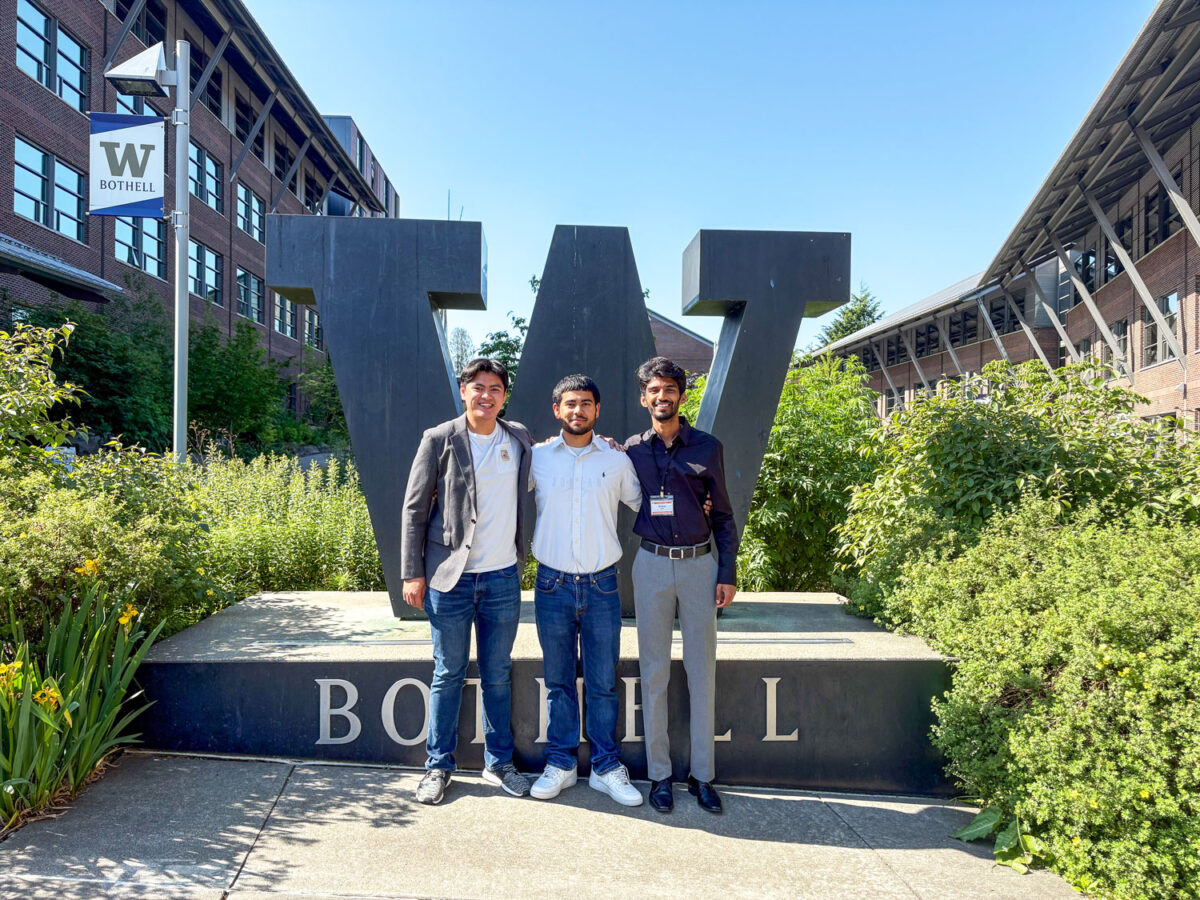
Dr. Stephen Jones, assistant professor in the University of Washington Bothell’s School of Business, is committed to investing in the broader community. One of the way he supports the University’s goal to engage with the community is through Strategic Management, a course that gives students the opportunity to act as consultants for local businesses, organizations and nonprofits.
“This work fulfills UW’’s mission as a public university — to disseminate knowledge and strengthen the communities around us,” Jones said. “Also, I believe in our values of diversity and collaboration, and community-engaged projects help the School of Business collaborate with diverse businesses and not-for-profit organizations. They build us, and we strengthen them.”
For 2022 alumna Patricia Rojas Phung, this class was the highlight of the Master of Business Administration program. “I learned so much in just one quarter. This class brought together all of the skills I had gained in the master’s program, from finance and marketing to accounting and leadership,” she said. “And, I got to use these skills to help a health care business better serve the public.”
Merging passions
Phung worked with PatCen Healthcare, a healthcare technology company that brings premium, high quality and affordable patient-centric solutions to the provider community worldwide.
The mission of the company resonated with Phung, who for many years, planned to pursue a career in medicine. “Since I was young, I have wanted to help people,” she said, “and health care is something that I have become increasingly passionate about.”
The new developments in technology during the pandemic, such as telehealth — the distribution of health-related services and information through electronic technologies — inspired Phung who shares equal passion for the information technology field.
“I want to contribute to the use of technology to break down barriers that prevent others from accessing health care,” she said. “Working with PatCen Healthcare, I felt I was able to do that.”
Putting together a plan
PatCen enlisted the students’ help to resolve a supply-chain issue and find three possible suppliers in North American that fit the company’s requirements.
Phung and her team were given six weeks to complete the project. One of Phung’s teammates, Adam Erickson, had just taken a project management class and knew that dividing the group into sub teams would help them meet the deadline. “One team worked on creating a supplier list, another team worked on crafting the email template, and the third team looked for vendors,” she explained.
“We reached out to 41 vendors and heard back from about 30 percent of them. In the end, we reviewed four quotes, one of which one was right on target. By the time we finished the project, we had another four pending quotes.”
Sujit Kumar, co-founder and CEO of PatCen Healthcare said, “The team came together very quickly and formulated the problem, structured set of solutions and gave us actionable recommendations that we will implement. Overall, a very high quality initiative that will significantly benefit PatCen for many years to come.”
And while the students’ impact was significant, so were their challenges. “One of our team members had a baby, two of our team members had COVID-19, and two others had to fly out of the country for work,” Phung said. “Nonetheless, we covered for each other and made sure we all stayed up to date. It was a true collaboration.”
Teams triumph, business booms

Three other student teams from the same class also partnered with local organizations, including the Economic Alliance of Snohomish County, Ironwood Manufacturing and DevMatch.
DevMatch, a membership site where entrepreneurs and developers can meet, was co-founded by Alan Gonzalez, another UW Bothell alumnus from the School of Business. He solicited the students’ help to create strategic perspectives and tactical plans that he could execute immediately to grow his company.
“The broad range of reflections, angles and suggestions demonstrated the diversity and wide experiences of the students,” Gonzalez said. “With minimal intervention, the groups took the DevMatch vision and explored competition, ran customer interviews, prepared financial plans and ultimately made compelling recommendations.”
A student of this class when he was at UW Bothell, Gonzalez said it felt like coming full circle. “Just two years ago I was presenting to a startup and now I am on the receiving end,” he said. “I recall how hard my team worked to deliver a thoughtful strategy recommendation. Now, I reflect on how fortunate our company is to have the brainpower and perspectives of these professionals.”
Supporting business and communities
Executives with the EASC and Ironwood Manufacturing agree with Allen’s sentiment. “Working on this project together was fun, enlightening and impressive,” said Trey Clasen, owner of Ironwood. “We are currently implementing four of the solutions the students provided and are investigating many more.”
Ironwood came into the project seeking advice on how to grow its business. Based on interviews with builders, designers and architects from the residential market, the students recommended Ironwood appeal to homeowners to sell its products in the residential market. “The best way to do this is through a strong social media campaign,” said Elaine Doyle, student in the MBA program. “We recommended sponsoring posts on Instagram and Facebook, geofencing to affluent areas, utilizing popular hashtags and taking advantage of augmented reality applications.”
The students who worked with the EASC came up with a similar marketing plan to promote SnoCo Creative Haven, a new program that “provides entrepreneurs, BIPOC, LGBTQIA and small business owners with the support they need to launch or expand their businesses.”

The students suggested a marketing plan that focuses on generating awareness through various channels including flyers, websites, search engines, social media and events. “It’s important that the messaging stays consistent across all channels,” said RT Akins, student in the MBA program. “The positioning and messaging should always aim to highlight the experience that Creative Haven customers should expect, as well as the overall value that the organization is providing through its services.”
Innovative ideas and work ethic
Garry Clark, president and CEO of the EASC, said, “The engagement with the UW Bothell students was amazing. Not only did they provide a thorough assessment of the small business needs in Snohomish County, but they also looked at ways in which we could improve engagement, support and awareness.”
Jones said he is extremely proud of all his students accomplished and the impact they made on the community.
“It’s such a privilege to work with students and guide them through this process,” he said. “Being in that mentor role rather than educator role allows me to work more closely with them and I am continually impressed by their innovative ideas and work ethic. As always, it was a privilege.”



